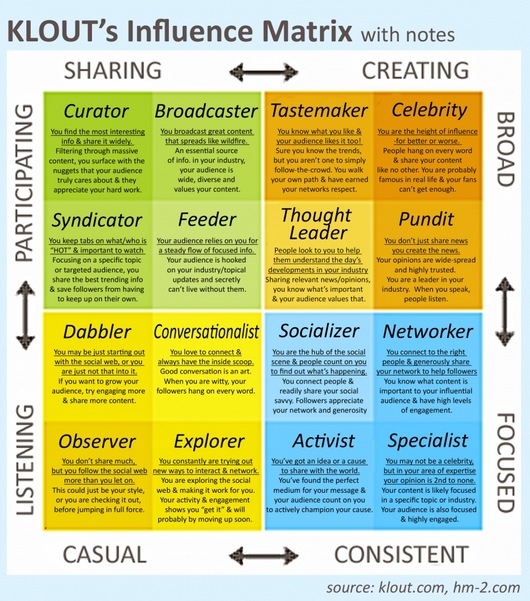In constant evolution, Klout is amplifying the criteria feeding its algorithms as it handles a multi-billion mass of data to measure e-reputation.
This tool is becoming a veritable observation-post of digital influence, with key indicators for developing a social media strategy. For two years now the Internet has been undergoing profound changes; the Mountain View firm tracks poor quality netlinking in order to improve results in its search-engine pages. It is a strategy that raises a lot of feedback on the net, so much so that one comes to wonder if mastery of the art of SEO still exists nowadays for the placing of a website in Serps.
So, have optimisation strategies for search engines come to a standstill ? It is hard to say; SEO is moving towards the social web, and by now SMO (Social Media Optimization) has become recognised as a strategy to increase its popularity. Quality content, not over-optimised, needs to be produced, because search engines estimate the value of a web-page through the opinions of users.
While Google attaches more importance to social media and integrates Google+ into its search results, Bing, which already includes Twitter, Facebook, Foursquare and Quora , has signed a major partnership agreement with Klout to mutually post the results of the two platforms. Klout, which measures the degree of e-reputation of users, and also brand-names, thus becomes a pilot tool of the social web.
The company has announced this autumn that the « Klout » score will be displayed on Bing. It now takes Facebook pages into account (official announcement) in its influence measuring calculations. Klout is now recognised as an influence observer, allowing it to guide its networking and analyse everything that happens on social networks.
Klout has become important for the blogger, the web editor and brand-names. It is now possible to launch marketing campaigns to make loyalty clients of influencers through business/company pages « Brand Squads ».
Here is one of the key indicators of Klout Score: Influence matrix
Klout’s matrix of influence offers different types of influencers. This is a holistic look at your influence and how you use it. The Klout Influence Matrix identifies these specific 16 types: Syndicator, Feeder, Curator, Broadcaster, Tastemaker, Celebrity, ThoughtLeader, Pundit, Dabbler, Explorer, Conversationalist, Observer, Socializer, Networker, Specialist, Activist. The cool feature is the influence matrix. Many users do not give great importance to this matrix.
Check also Lisa Barone, co-founder and chief branding officer of Outspoken Media, in contrast, proposes a simpler list in Small Business Trends: The Five Types of Influencers On The Web.
Klout, votre influence et la nouvelle ère du référencement social, originally published in French.
- Vine: the new social media phenomenon
Released in January, it has already become the buzz on the Internet and suggests great opportunities for the future. Vine offers users the chance to create a short six second... - The first FlyBoard World Cup Championships in Doha
The first official competition takes place in Qatar from 18 to 21 October. The competition is the first World Championship for flyboarding to be hosted by Doha. The sporting event... - Take control of an airliner on a simulator
Flight Experience places you on the edge of the commander's seat to live the entire sequence of operations of a normal flight. Flight Experience offers the experience of... - Follow the Vendée Globe on Twitter
This large audience came to encourage the sailors, who are going to take on the most exciting, but also the most dangerous, nautical race of all. The start of the seventh...

